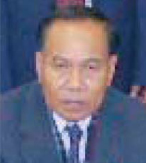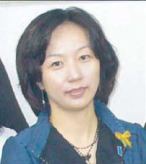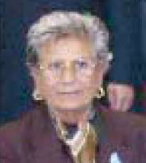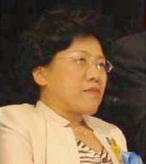Recourse for families of foreign victims.

Sukham Panchoi
(Older brother of Anocha, a Thai woman abducted by North Korea)
« In November 1978, I received an unexpected letter from someone who knew my sister well, and I left immediately to meet her in Bangkok. She explained that my sister had disappeared in Macau the 21st May 1978 along with two other girls from Macau. I admit I was distraught by this news. My little sister had been abducted, but why? What wo uld they do to her? She had only had 4 years of primary schooling, why would anyone want to kidnap her? I couldn’t understand at all. I am overcome with this incomprehension every day. This year I learned from Mr Jenkins’ notes that she is alive and well.»
22 December 2005.
Intervention by Suknam Panjoy at the Great Popular Assembly.

U-yaong Choi
President (at the time) of the council for families of victims of South Korea
« The 26th October 2005, to celebrate my fathers 60th anniversary, I tied a yellow handkerchief to the branch of a pine tree near the Imjin River. It was picked up by the South Korean media, and the ‘yellow handkerchief movement’ started to spread all over South Korea. That yellow handkerchief meant «I haven't forgotten you and I'm waiting for you».
From the 8th-12th December, during the international conference for Human Rights in North Korea in Seoul, the yellow ribbon was honored. North Korea reproached us for wearing the ribbon, claiming that there had never been any South Koreans abducted on their territory. In December, during the Inter-Korean Summit, we mentioned the abductions, but North Korea ignored us.»

M.C. Haidar
(Mother of Shiham, Lebansese citizen abducted by North Korea)
« Shiham, my daughter who was abducted by North Korea, returned to Lebanon in 1979. I went to see her straight away. I was really happy to see my daughter, but I found her in poor health and very tired and irritable. Through tears she admitted to me that she was with an American and she was pregnant with his child. If she was having a family and her husband was good to her, I couldn't prevent her returning to North Korea. But by allowing her to go back, I rea- lised that I had made a serious mistake. If I had known what kind of country North Korea really is, I would never have let her go back again. North Korea destroyed my daughter's life.They took advantage of her dream, which was to work abroad to help me live comfortably. They destroyed her existence and mine at the same time. My dream was to live with my daughter after I retired. But I’m all alone in Lebanon now. Shiham was my only daughter. My wish is to find her and her child again. That’s all.»

Mi-il Lee
(President of the Union of families of victims abducted during the Korean War)
«The number of South Korean citizens abducted by North Korea during the Korean War was over 100 000. In order to dry up human resources in South Korea, Kim Il-sung had commanded that southern minds be brought into North Korea by abducting them. Ever since, the Korean peninsula has become the stage for an intense cold war. This state of permanent tension prevents us from helping victims who were abducted by North Korea during the Korean War even though we can identify them. It is extremely frustrating.
On the 27th April 2006, I went to testify in the USA with Megumi Yokata’s mother during a public hearing at the House of Representatives. Japan is certainly able to exercise strong pressure on North Korea, but in my opinion, the USA is the most apt to sanction North Korea. The serious crimes of abduction perpetrated by North Korea started in the 50’s under the reign of Kim II-sung. Abductions destroy the precious lives of victims and their families. They represent an unpardonable violation of Human Rights »
28 May 2006.
Intervention by Lee Mi-il at the Great Popular Assembly.